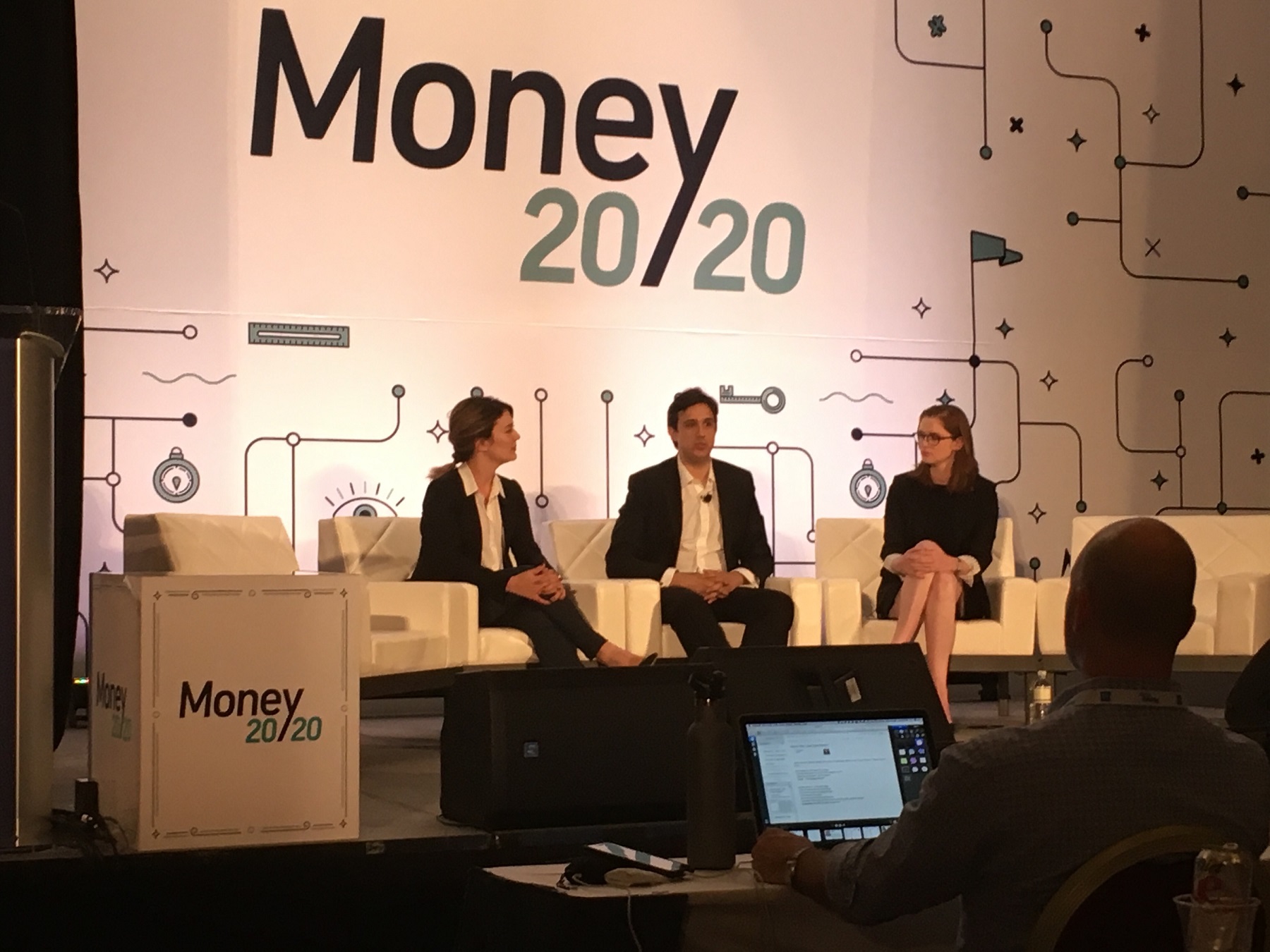 EMERGING TECH
EMERGING TECH
 EMERGING TECH
EMERGING TECH
 EMERGING TECH
EMERGING TECH
The wild world of initial coin offerings got a little wilder on Tuesday as the husband-and-wife team who founded blockchain startup Tezos appeared publicly for the first time since a behind-the-scenes battle over control of the nonprofit fundraising foundation erupted into the open last week.
Speaking at the Money 20/20 financial technology conference in Las Vegas, Arthur Breitman (pictured, middle) and his wife Kathleen (right) went out of their way to reassure a packed room, which included some Tezos investors, that the company’s $232 million digital coin offering will overcome the latest difficulties.
“There’s not any critical jeopardy to the project,” said Kathleen Breitman. “It stinks. This will blow over.”
The Breitmans are seeking to remove Johann Gevers as head of the Swiss-based custodial foundation, claiming that he allegedly engaged in “self-dealing, self-promotion, and conflicts of interest” as outlined in a letter they sent to the board. On Tuesday, Arthur Breitman made clear that he hasn’t changed his feelings about Gevers.
“The president of the foundation is probably not a good fit for the project,” Breitman said. “I think he did some things which were bad.”
Gevers has fired back, accusing the founders of “misleading statements and outright lies.” A Boston law firm has launched an investigation amid rumors of a potential class-action lawsuit. Kathleen Breitman also indicated that the company’s trustees are conducting their own investigation.
The difficulties surrounding Tezos are just part of the controversy swirling around ICOs these days. The concept is fairly simple. A company is formed — in Tezos’ case, Dynamic Ledger Solutions Inc. — and it raises funds by creating and then selling its own digital currency in units of coins or tokens. Those can then be exchanged for either a recognized currency such as the U.S. dollar or another digital form of money such as bitcoin.
As the price of bitcoin has skyrocketed over the past year, to $5,496 in U.S. dollars this week, many more companies are jumping into the fray. There are more than 800 cryptocurrencies available today with a market capitalization of $87 billion.
Venture capital firms are being deluged with ICO project proposals. At the Money 20/20 conference on Tuesday, two technology investors reported that they were receiving 50 to 70 pitches per week, usually submitted in the form of 40-page technically dense white papers, and had hired extra staff to perform the evaluations.
“It’s bringing back the ability for a retail investor to get in early,” said Dan Morehead, chief executive officer of Pantera Capital, an investment firm focused on blockchain technologies. “The only criterion for possession of an ICO is owning a smartphone.”
This easy ability to start and invest in digital currencies is leading to greater regulatory scrutiny and has prompted some nations to severely curtail new ICO growth. China issued a ban on ICO funding in September and South Korea took similar action just three weeks ago. This past weekend, Russian President Vladimir Putin issued new regulations around ICOs.
In the U.S., the Securities and Exchange Commission issued a ruling in July that declared cryptocurrency units as financial securities and therefore subject to the law. But a number of people affiliated with the market are not so sure.
“We’re in this big gray world in the middle where people aren’t sure if they’re securities or not,” said Erik Syvertsen, general counsel at the online tech investing forum AngelList.
What is prompting skepticism among government authorities are concerns that some companies are using ICOs to prop up ailing businesses. One of the most successful ICOs to date has been Kin, which sprang from the messaging app company Kik earlier this year. Kin was announced in June and raised nearly $100 million in investment by the end of September.
Kik CEO Ted Livingston admitted at the conference that his business had been struggling, but defended his decision to form an ICO as necessary to counter the economic strength of the larger technology players. “It’s not just a way to get funding, it’s a way to compete,” Livingston said.
Meanwhile, even those who have either formed ICOs as blockchain startups or funded the ventures openly believe that a significant percentage of ICO companies will vaporize in the near future. “I believe that 80 percent of tokens are on life support or will be gone,” Morehead said.
Whether one of those disappearing ICOs will be Tezos remains to be seen. The promise of digital currency and the blockchain was that no transaction could be “hidden” off the books.
Now, a company offering a governance protocol is having governance problems of its own. Said Kathleen Breitman: “We appreciate the irony of the situation.”
Support our mission to keep content open and free by engaging with theCUBE community. Join theCUBE’s Alumni Trust Network, where technology leaders connect, share intelligence and create opportunities.
Founded by tech visionaries John Furrier and Dave Vellante, SiliconANGLE Media has built a dynamic ecosystem of industry-leading digital media brands that reach 15+ million elite tech professionals. Our new proprietary theCUBE AI Video Cloud is breaking ground in audience interaction, leveraging theCUBEai.com neural network to help technology companies make data-driven decisions and stay at the forefront of industry conversations.